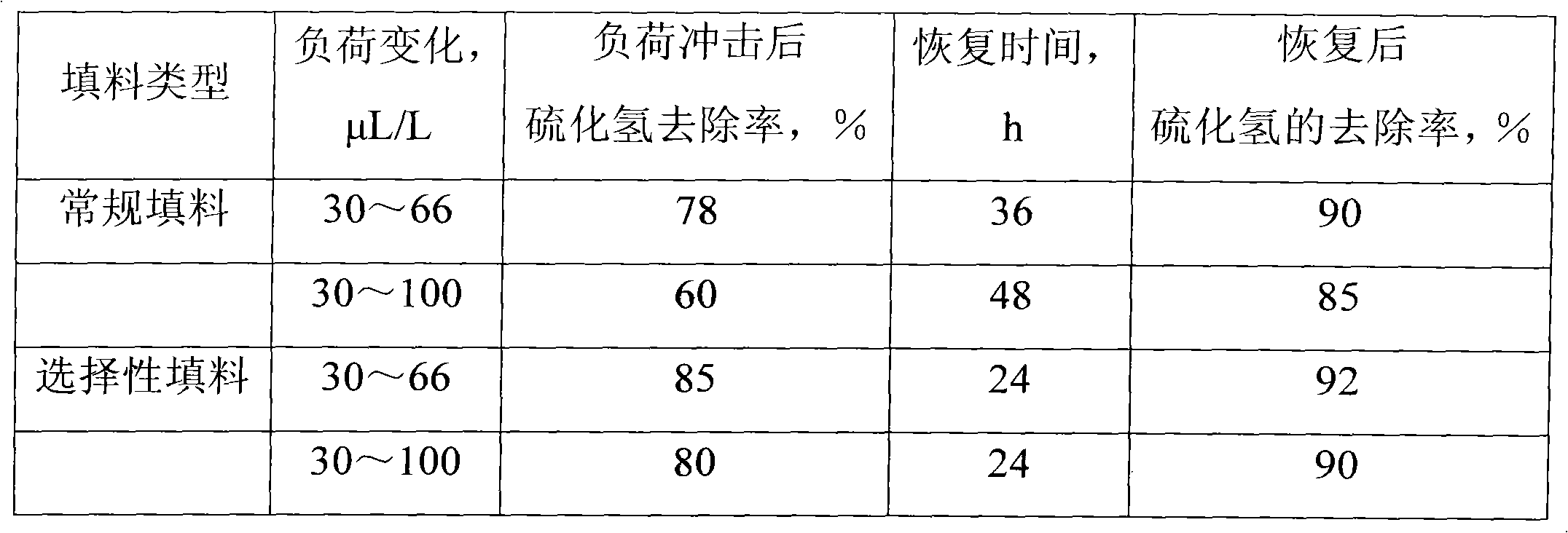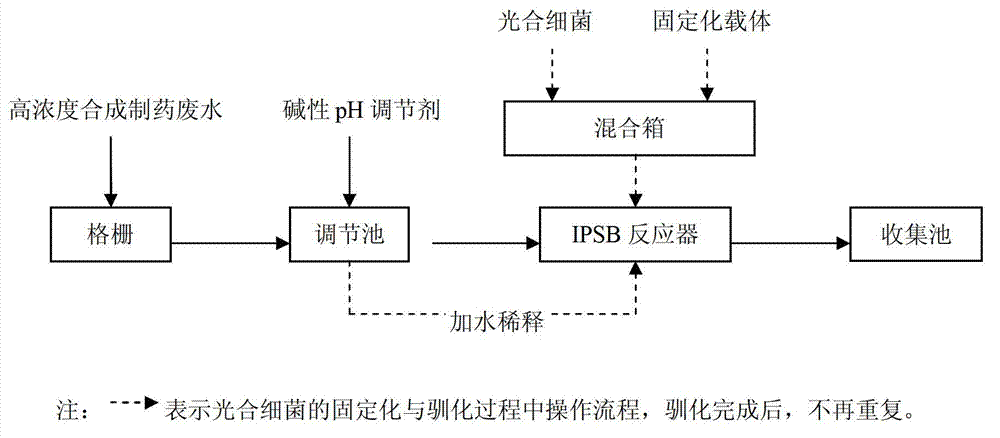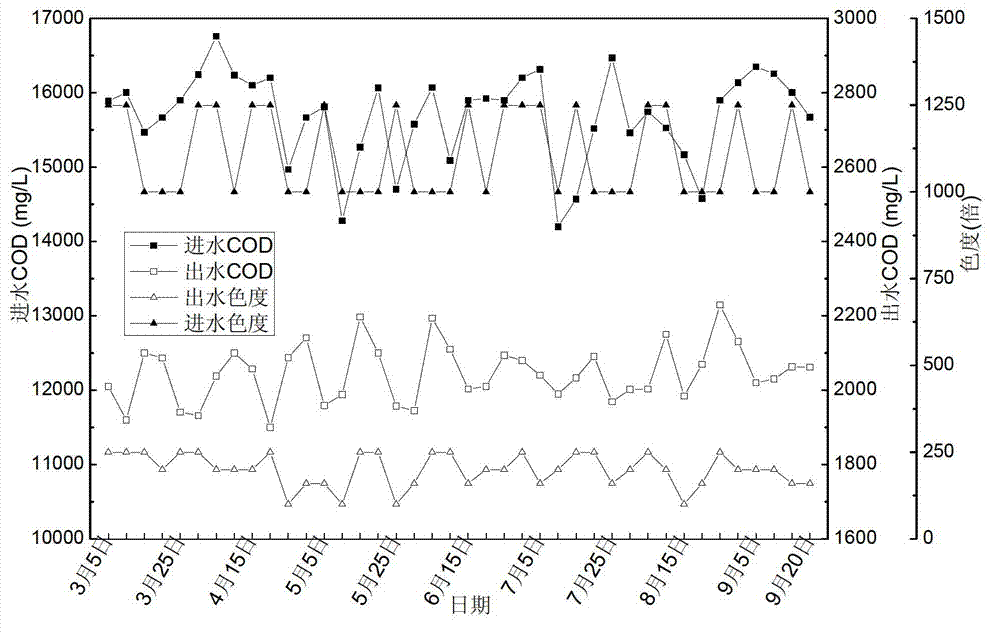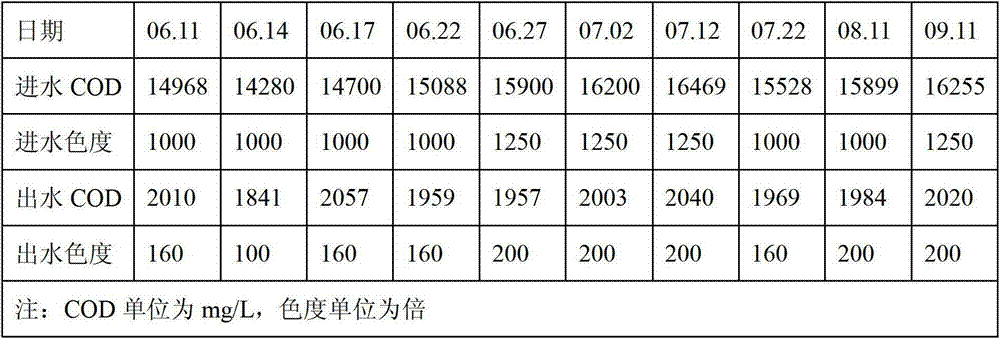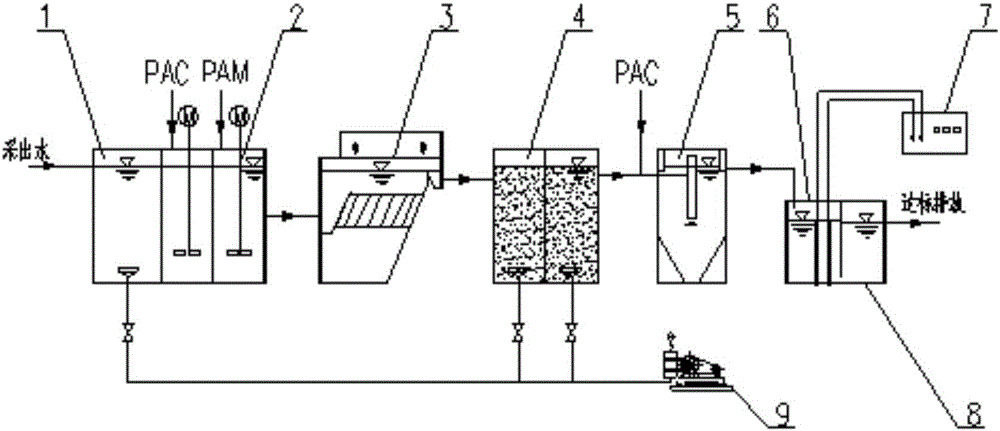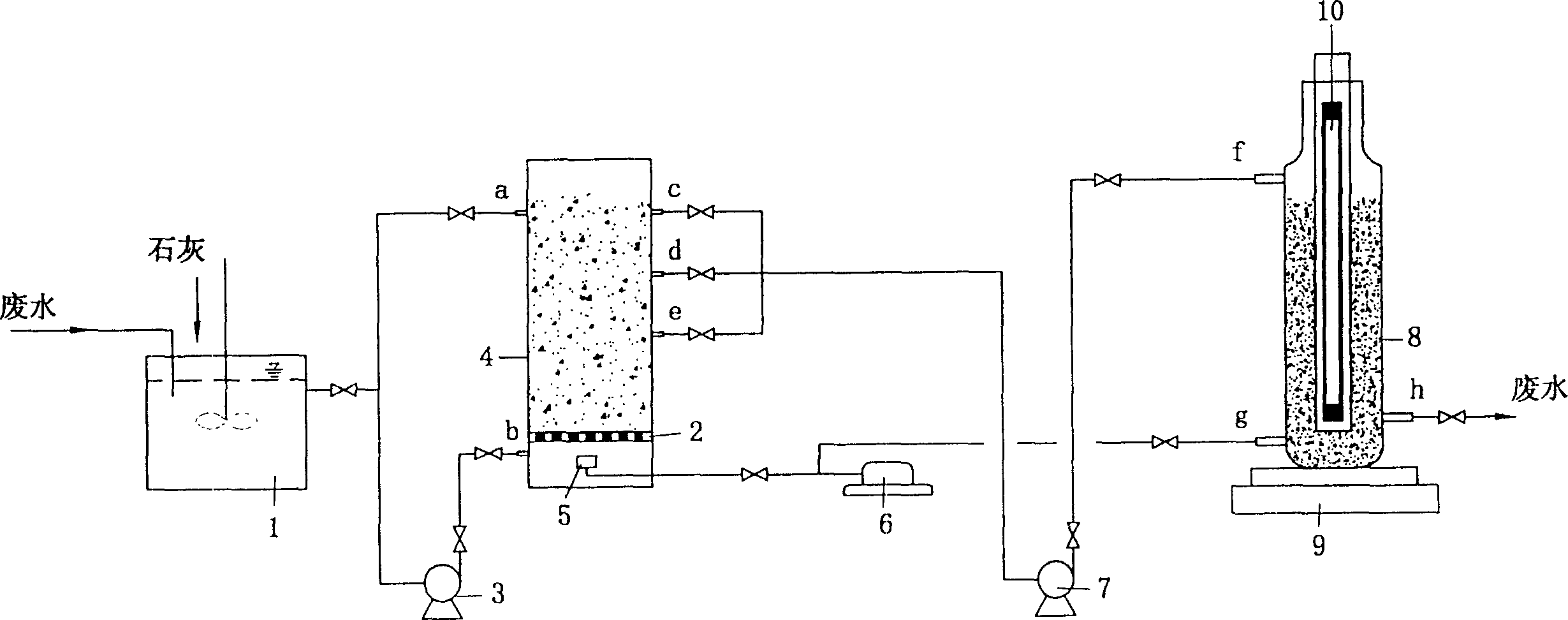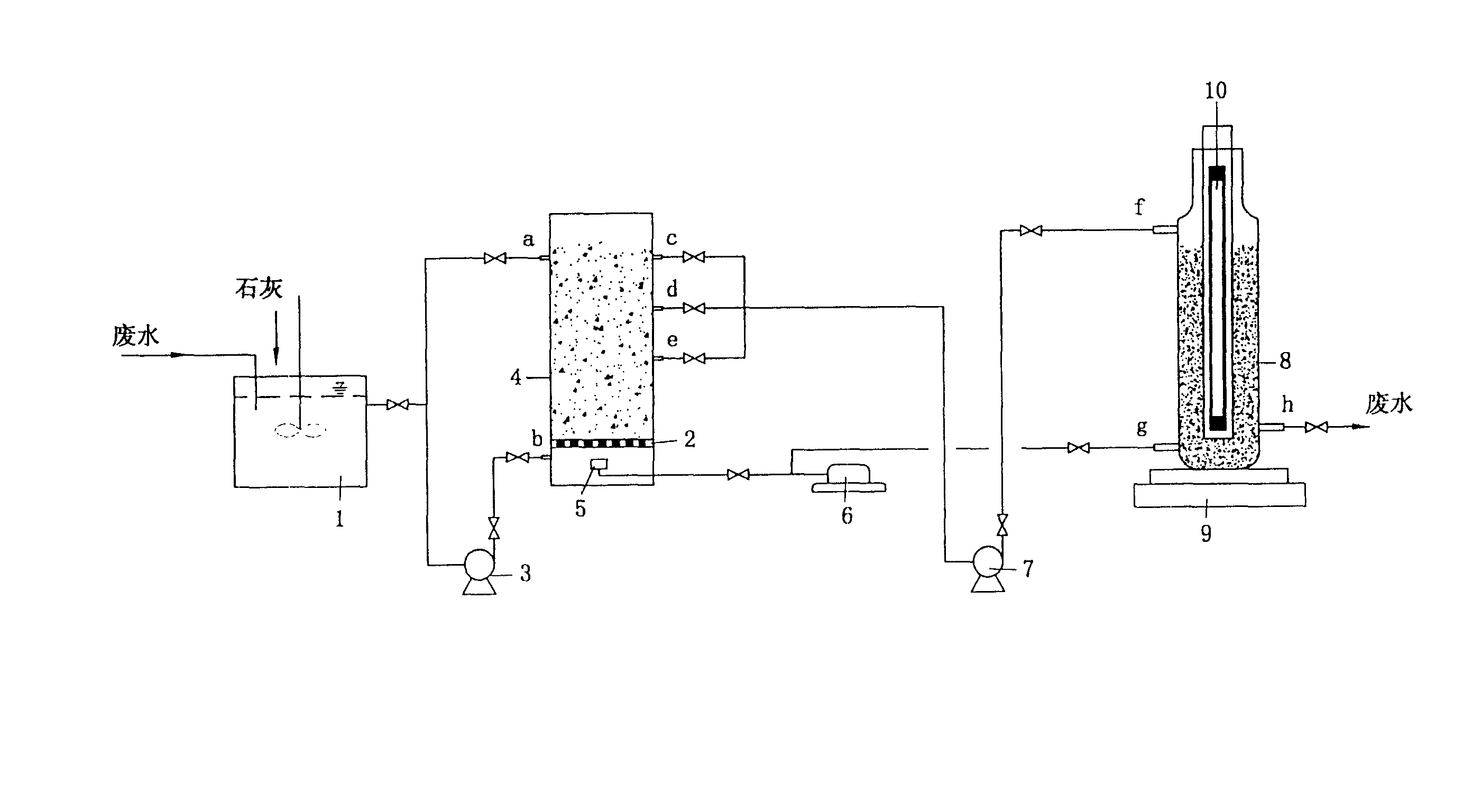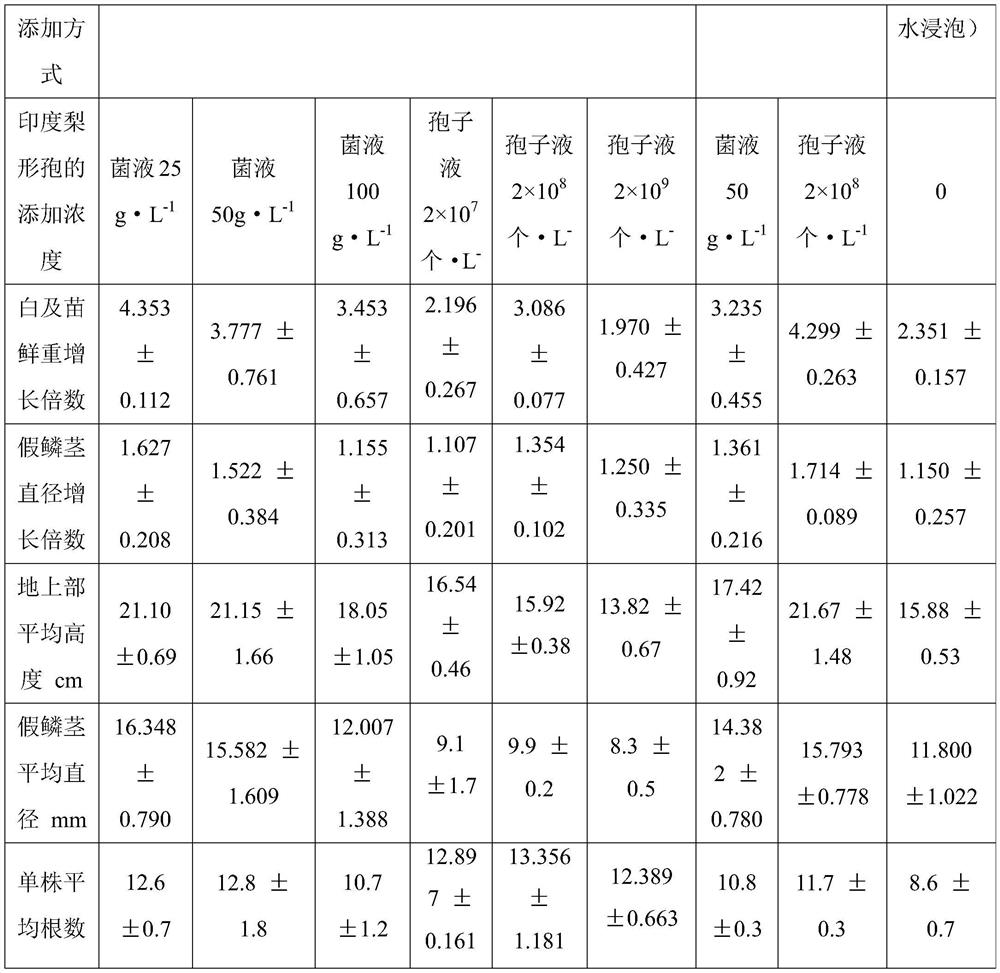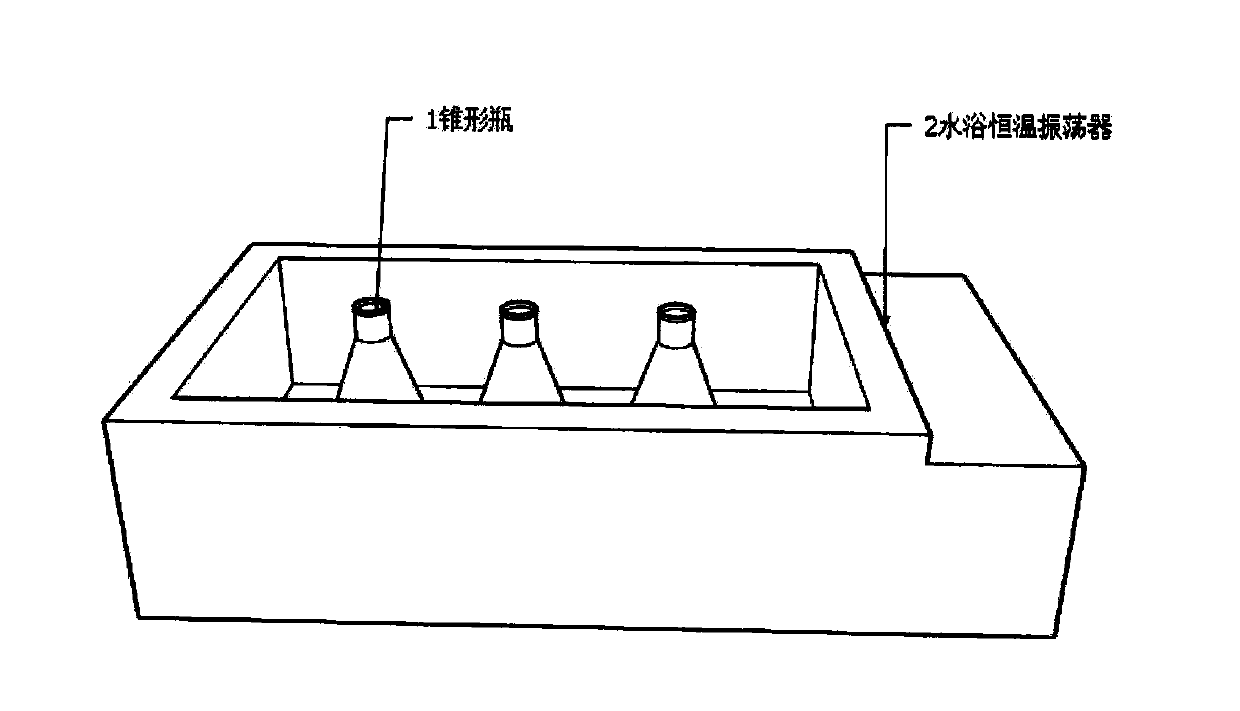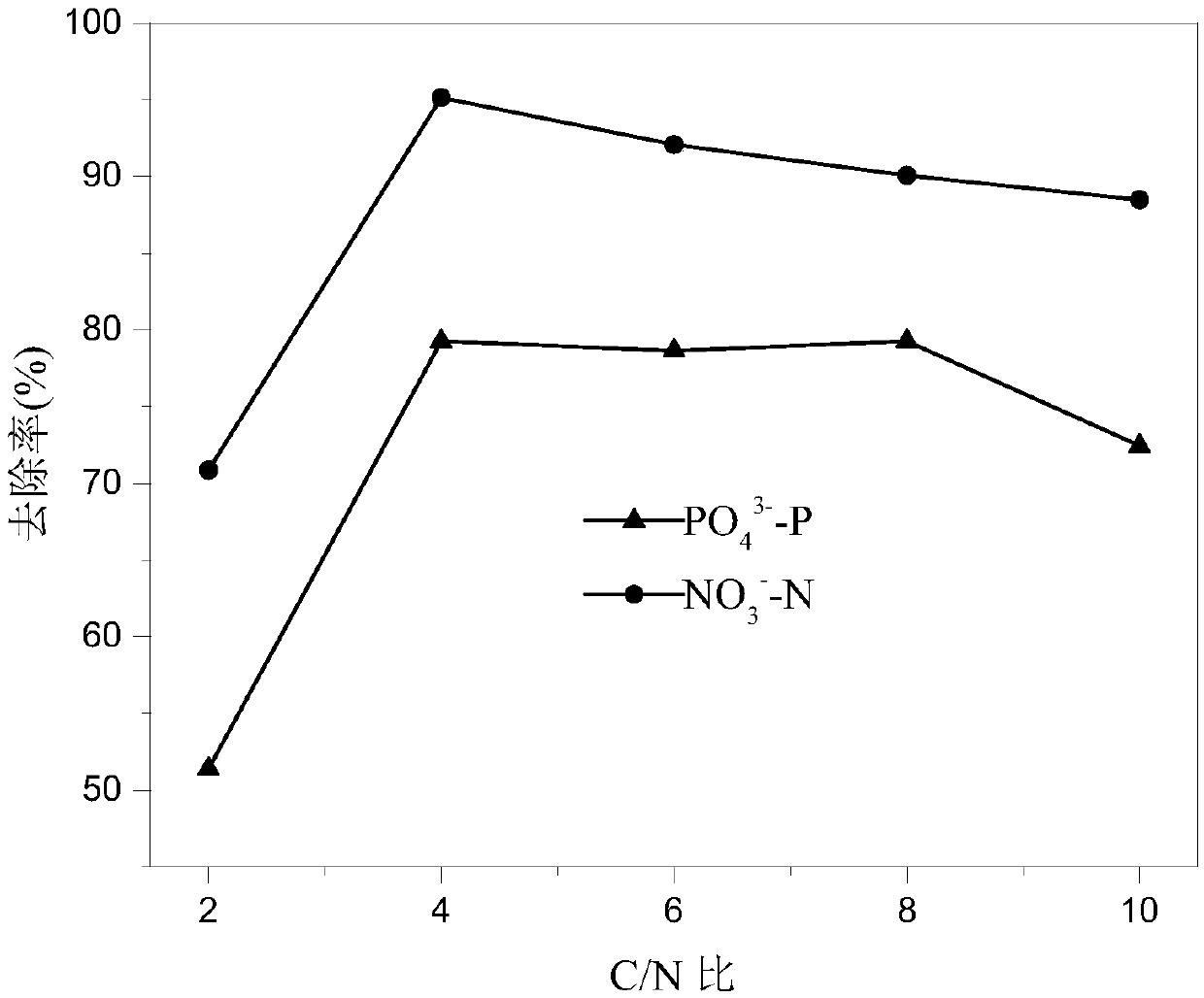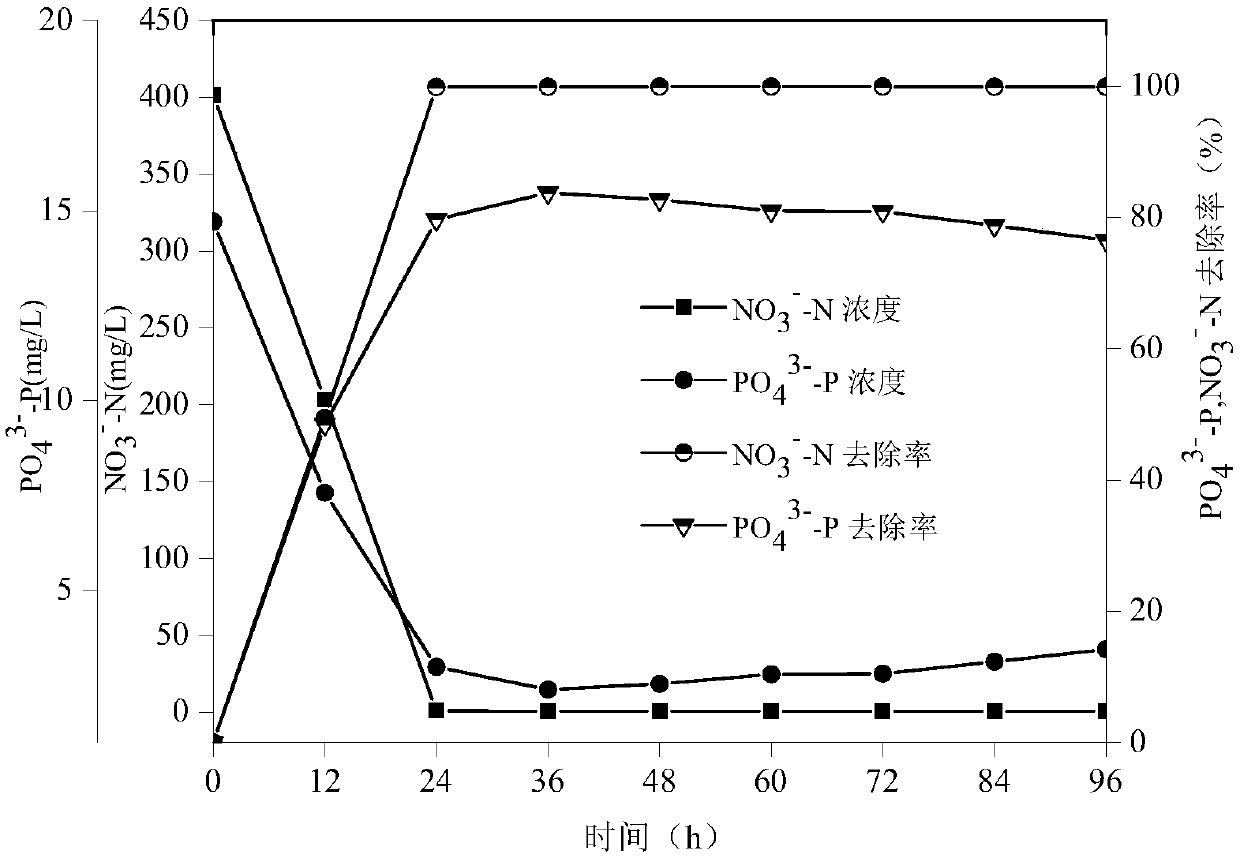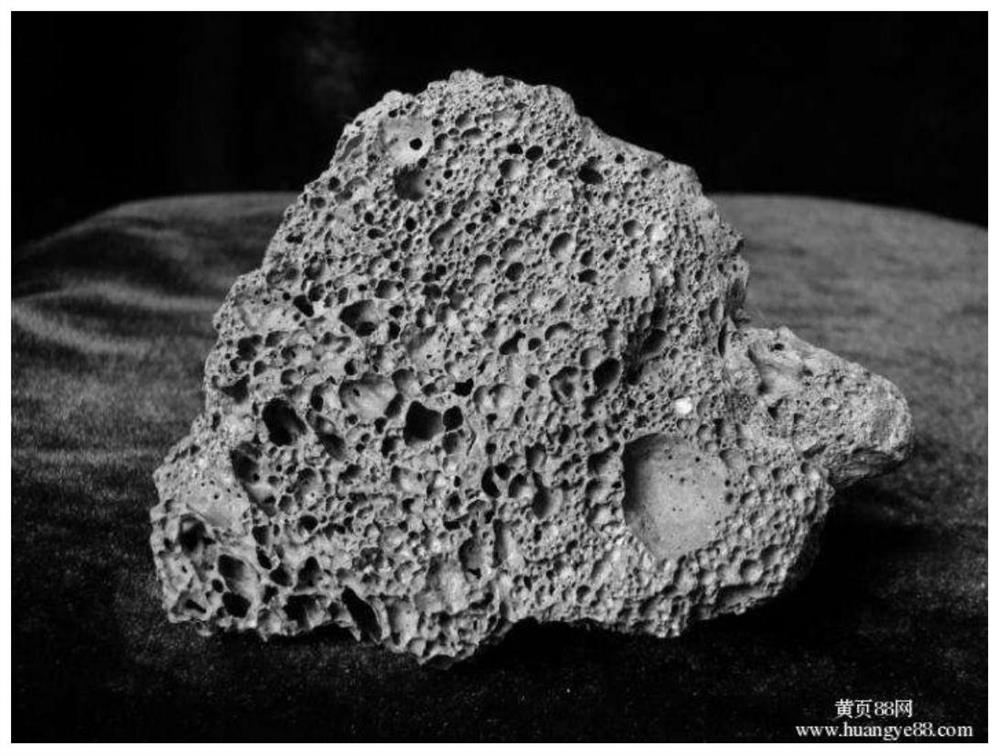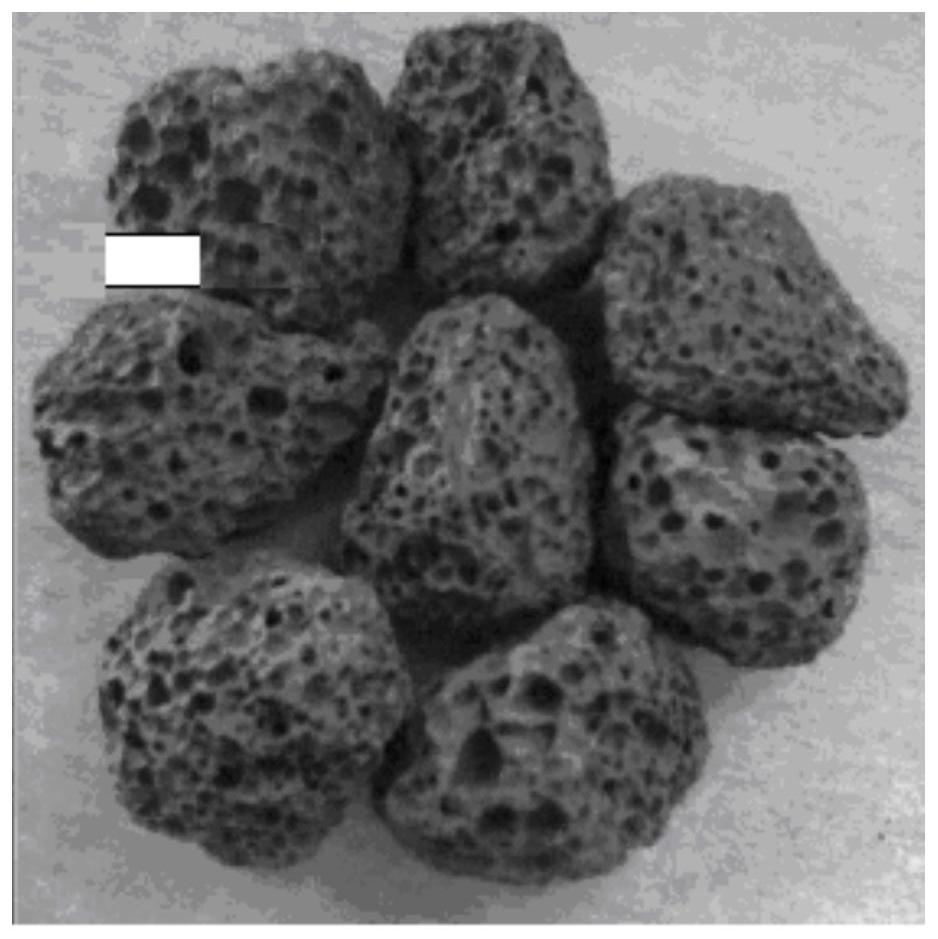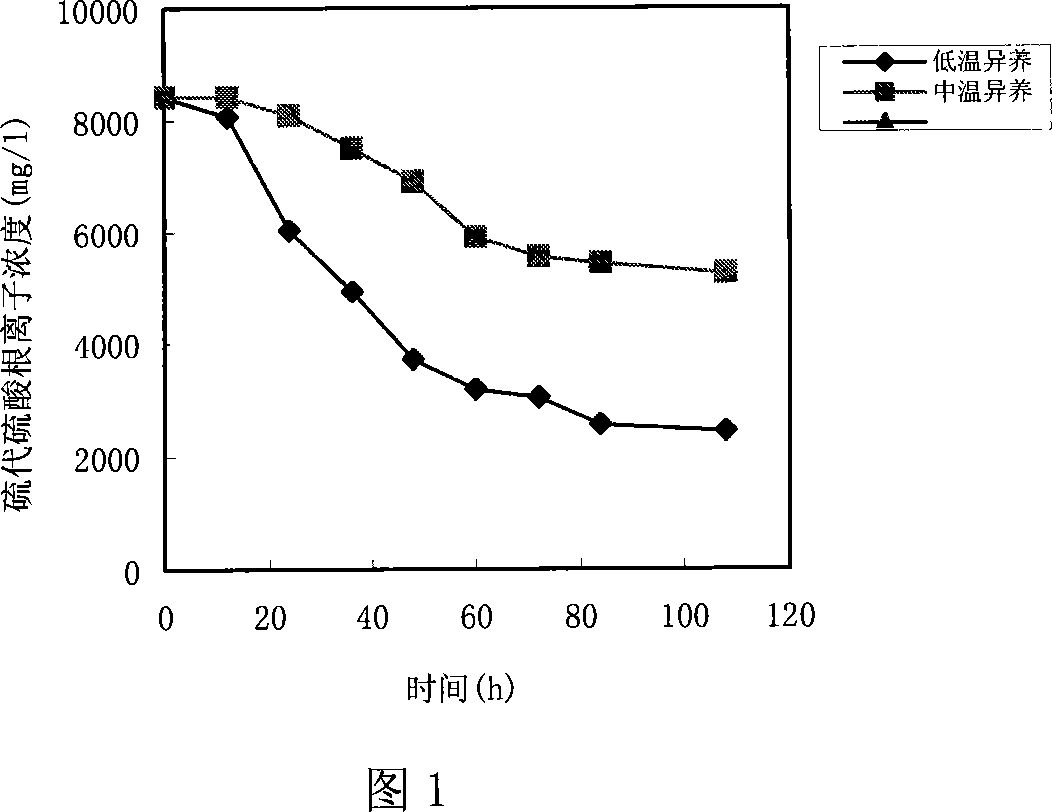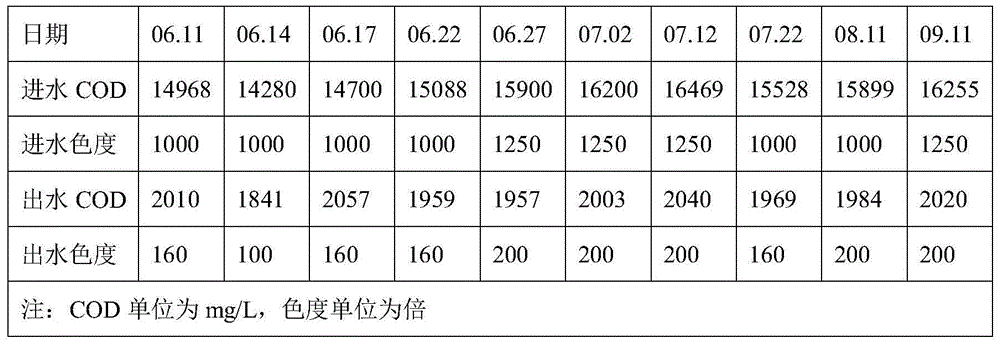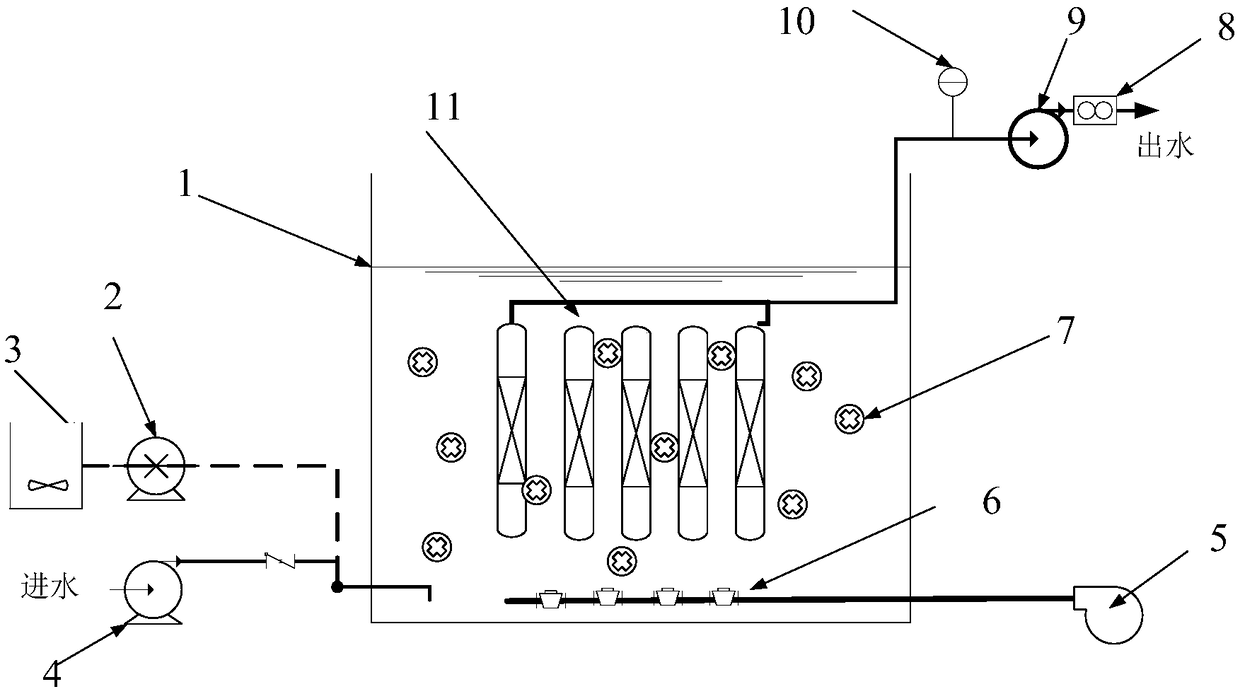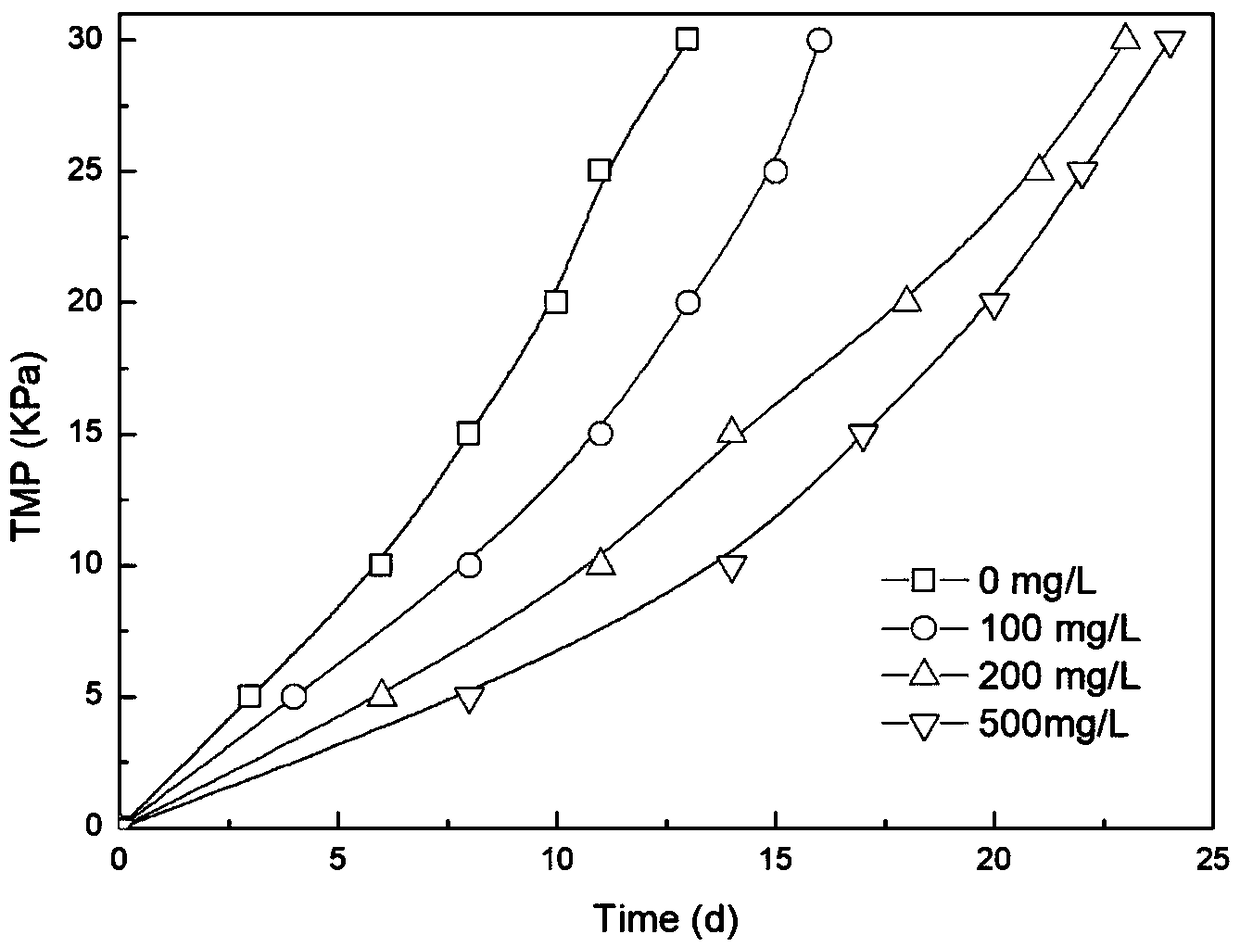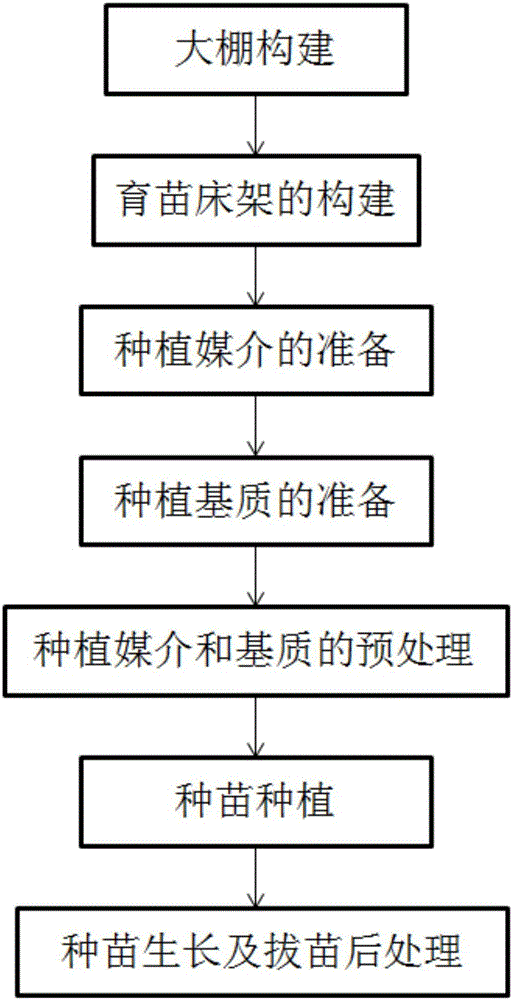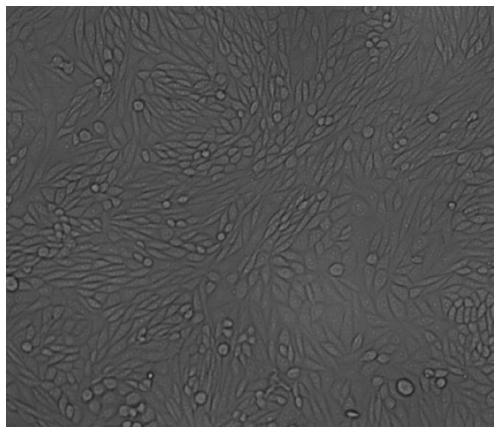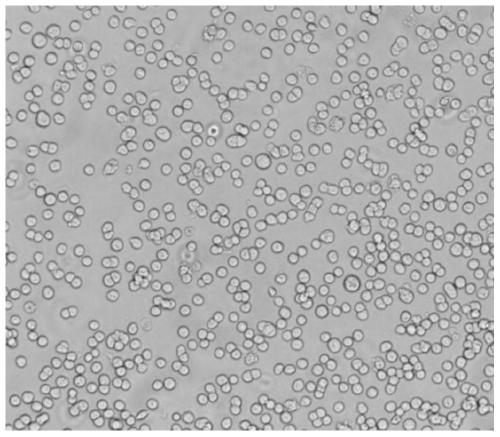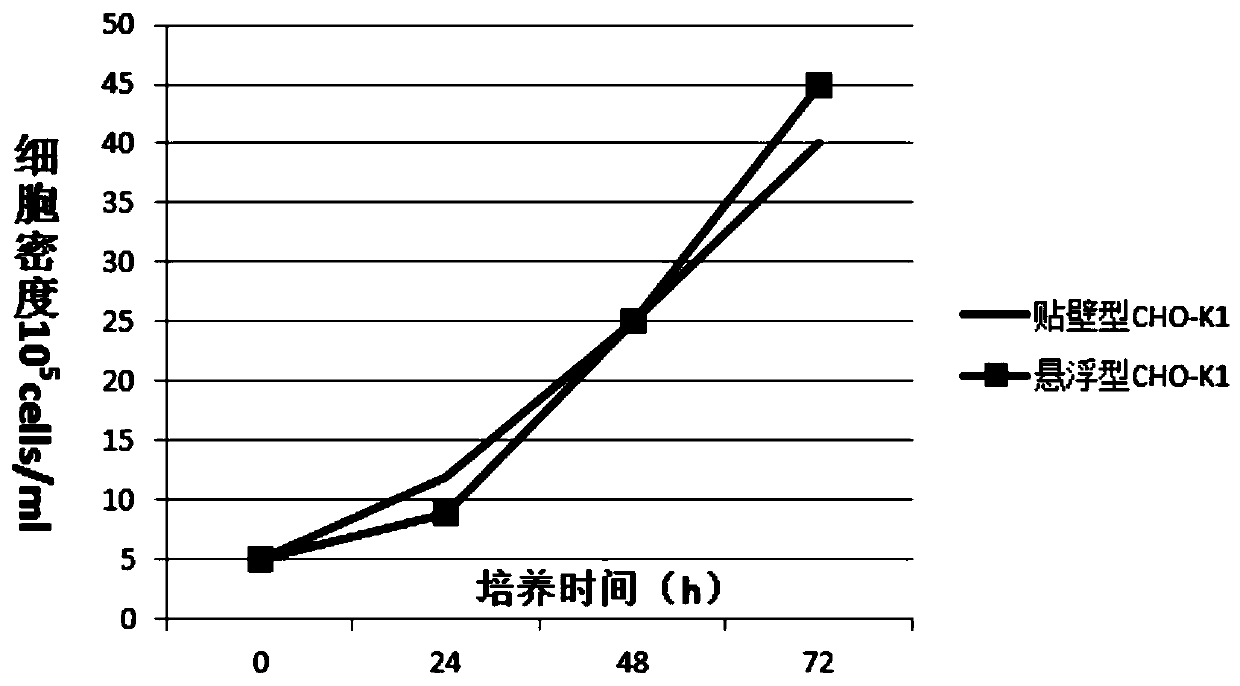Patents
Literature
Hiro is an intelligent assistant for R&D personnel, combined with Patent DNA, to facilitate innovative research.
33results about How to "Short domestication period" patented technology
Efficacy Topic
Property
Owner
Technical Advancement
Application Domain
Technology Topic
Technology Field Word
Patent Country/Region
Patent Type
Patent Status
Application Year
Inventor
Method for preparing selective microbial packing
InactiveCN102050516ASuitable for growthImprove impact resistanceDispersed particle separationAir quality improvementFiberActivated sludge
The invention relates to a method for preparing selective microbial packing. A plant organic fiber or a mixture of the plant organic fiber and activated carbon is used as basic packing, and the method comprises the following steps of: screening, separating and purifying activated sludge to obtain specific desulfurization bacteria; massively propagating and culturing the bacteria in nutrient solution to prepare desulfurization bacterium mother solution; and performing nutrient solution soaking, spraying and mother solution biofilm formation on the basic packing to prepare the selective microbial packing. The biological packing is used for microbial purification in waste gas treatment, and is particularly used for removing stinky pollutants produced in petrochemical plants, sewage treatment plants, urban sewage treatment plants, animal husbandry farms and the like. By the method, class I pollutants in exhaust gases of a refinery are treated specially, the treatment load and efficiency of the pollutants are improved, and impact resistance during change of working conditions is improved.
Owner:CHINA PETROLEUM & CHEM CORP +1
Pretreatment method of high-concentration synthesis pharmaceutical wastewater
ActiveCN103086572ALow priceEasy to trainMultistage water/sewage treatmentBiological water/sewage treatmentHigh concentrationPretreatment method
The invention discloses a pretreatment method of high-concentration synthesis pharmaceutical wastewater, which belongs to the field of wastewater treatment. The pretreatment method comprises the following steps of: carrying out immobilization on photosynthetic bacteria and feeding the immobilized photosynthetic bacteria into an IPSB (Immobilized Photosynthetic Bacteria) reactor; domesticating the immobilized photosynthetic bacteria by using low-concentration synthesis pharmaceutical wastewater; regulating the pH value of the high-concentration wastewater to be treated and adding into the IPSB reactor to conduct micro-aerobic biological reaction; after the reaction, depositing and discharging the water; and further treating the supernate. The method is applicable to pretreatment of high-concentration synthesis pharmaceutical wastewater, the water intake COD (Chemical Oxygen Demand) concentration can be 16,000mg / L, the chromaticity can be 1250 times, the salt content can be 20,000mg / L, the sulfate radical concentration is as high as 5,000mg / L, the water outtake COD concentration is as low as 2,000mg / L, and the chromaticity is reduced to 100 times.
Owner:SHANDONG NEWTIME PHARMA
Method for acquiring microbes capable of degrading octachlorodipropyl ether from soil or sludge, and octachlorodipropyl ether-degrading bacterium
ActiveCN106085897APromote degradationImprove degradation rateBacteriaMicroorganism based processesMicroorganismSludge
The invention discloses a method for acquiring microbes capable of degrading octachlorodipropyl ether from soil or sludge, and a high-efficiency octachlorodipropyl ether-degrading bacterium According to the method, sludge or soil containing octachlorodipropyl ether and acquired from a petrochemical factory, a mosquito-repellent incense factory, farmland or other places is used as a sample, and culture of a microbial strain, separating, purifying, domestication and screening are successively carried out so as to select out the octachlorodipropyl ether-degrading bacterium. The method provided by the invention extracts from soil and sludge an Enterobacter aerogenes strain M2016517 with high octachlorodipropyl ether degradability, and the Enterobacter aerogenes strain M2016517 is preserved in Guangdong Microbiological Culture Collection Center on May 17, 2016, with an accession number of GDMCC No. 60041. The octachlorodipropyl ether degradation rate of the strain is as high as 95%. The method provided by the invention can achieve the purposes of screening and domestication of the strain at the same time, so the domestication period is obviously shortened; moreover, the method is simple, convenient and efficient, and the screened octachlorodipropyl ether-degrading bacterium has high octachlorodipropyl ether degradation rate.
Owner:SOUTH CHINA AGRI UNIV
Tissue-culture rapid propagation and seedling raising method for ficus altissima cv. yellow gem
ActiveCN104472365AStable genetic traitsAvoid enteringHorticulture methodsPlant tissue cultureDiseaseGreenhouse
The invention discloses a tissue-culture rapid propagation and seedling raising method for ficus altissima cv. yellow gem. The tissue-culture rapid propagation and seedling raising method is implemented by five steps of explant culture, explant induction, domestication and subculture multiplication of asepsis material, seedling-strengthening and rooting culture and greenhouse planting. The tissue-culture rapid propagation and seedling raising method is characterized in that a perennial, good and strong ficus altissima cv. yellow gem with excellent maternal characters and no disease and insect damage are selected as a mother plant; and an MS improved medium in all the steps is obtained by changing the used amount of KNO3 in a standard MS medium to be 950mg.L<-1>, changing the used amount of NH4NO3 to be 825mg.L<-1> and removing pure-yellow buds and pure-green buds in time in the culture process. The tissue-culture rapid propagation and seedling raising method disclosed by the invention has the advantages that the survival rate of seedlings is more than 98%, the variation rate is less than or equal to 1.0%, and a great amount of good-quality seedlings can be obtained in a short time.
Owner:SUNSHINE HORTICULTURE
Culturing method of microbe for high temperature waste water biochemical treatment
InactiveCN1597569AEasy to handlePromote degradationBiological water/sewage treatmentMicroorganismSludge
A process for culturing the microbes used to biochemically treat high-temp sewage includes such steps as choosing the active sludge in ordinary biochemical aeratnig pool as bacterial seeds, depositing, aerating, adding the sewage of oil field, removing supernatant, adding stabilizer of protein and growth promoter of microbes, and naturolizing.
Owner:CHINA PETROLEUM & CHEM CORP +1
Acclimation method of wild Bletilla striata seedlings
InactiveCN107439201AImprove sustainabilityIncrease economic resourcesClimate change adaptationFertilising methodsBletilla striataEnvironmental factor
The invention relates to an acclimation method of wild Bletilla striata seedlings. The acclimation method includes: selecting and preparing acclimation land, collecting Bletilla striata seeds, performing primary acclimation, performing secondary acclimation, transplanting, selecting seeds and the like. The acclimation method has the advantages that the hilltop-condition cultivation land is selected for cultivating Bletilla striata, the hilltop-condition cultivation land is the decisive environment factor for keeping the medicinal effect of original wild Bletilla striata, basic data is provided for the further summarization of Bletilla striata planting technologies, the development of industry for converting wild Bletilla striata into artificial planting is promoted, reliable-quality Bletilla striata seeds are provided for Bletilla striata planting expansion, the problems that wild Bletilla striata resources are in shortage and the shortage affects traditional Chinese medicine industry raw material stability are solved, a large number of high-quality goods sources for the field of Bletilla striata circulation, the development of related matched industries is promoted, Bletilla striata planting sustainability is promoted, and income of planting-area farmers is increased; the Bletilla striata acclimation cycle of the acclimation method is shortened by 8-10 months as compared with that of a traditional acclimation method, and a large number of Bletilla striata seedlings can be acclimated in one year.
Owner:桂平市蒙圩镇火炎种养专业合作社
Treatment method and treatment apparatus for oil filed produced water
ActiveCN106542693AGood effectLow running costWaste water treatment from quariesMultistage water/sewage treatmentElectricityFluidized bed
The present invention provides a treatment method and a treatment apparatus for oil filed produced water. The treatment method specifically comprises that produced water is treated by using an air oxidation / coagulation air flotation / biological fluidized bed / vertical flow precipitation / electrocatalytic oxidation combination technology, and belongs to the field of environmental protection. The treatment apparatus comprises an air oxidation groove, a coagulation groove, a multi-phase inclination plate air floatation machine, a biological fluidized bed reactor, a vertical flow type precipitation pool, and an electrocatalytic oxidation reactor. According to the present invention, after the produced water is treated, the oil content is reduced to 0 from 96 and the removal rate is 100%, the suspended solid is reduced to 2 mg / L from 306 mg / L and the removal rate is 99.3%, the CODcr is reduced to 10 mg / L from 832 mg / L and the removal rate is 90.4%, the BOD5 is reduced to 15 mg / L from 236 mg / L and the removal rate is 93.6%, and various indicators achieve the grade 1 standard of Integrated wastewater discharge standard GB 8978-1996.
Owner:DALIAN INST OF CHEM PHYSICS CHINESE ACAD OF SCI
Production method of composite microbial agent for treatment of refractory wastewater
InactiveCN105524875AReduce manufacturing costLow priceMicrobiology processesBiological water/sewage treatmentMicrobial agentMaterials science
The invention relates to a production method of a composite microbial agent for treatment of refractory wastewater. The steps of the production method include: adding corn pulp, molasses or other composite carbon source into a production medium, inoculating a composite microbial community, and carrying out stepwise amplification culture under the conditions of dissolved oxygen 0.2-2.0 mg / L, microbial load 0.1-0.5 kgTOC / (kgSS. d) and TOC removal rate > / =80%. By using the production method, it is possible to produce the composite microbial agent in batch, and it is possible to omit strain compounding work from an agent production process. The production method has simple steps and good effect; the preparation cycle of the composite microbial agent is shortened, production cost is lowered, and the produced composite microbial agent is particularly suitable for the treatment of refractory wastewater.
Owner:BLUESTAR LEHIGH ENG INST CO LTD
Treating process of waste water containing binary acid and its appts
InactiveCN1161290CHang film fastShort domestication periodPhysical/chemical process catalystsWater/sewage treatment by irradiationUltravioletCatalytic oxidation
In the treatment of waste water containing binary acid, biological fluidized bed technology and Ag / TiO2 photocatalytic oxidation technology are adopted. Stuffing is added into the biological fluidized bed to increase the microbe living space, increase biomass and raise organic load rate; and partial water is made to circulate to increase oxygen dissolved in waste water and eliminate organic matters in water effectively in constant aeration condition. The effluent from the biological fluidized bed is then treated in Ag / TiO2 photocatalytic oxidation equipment with certain amount of catalyst and air as oxidant; and under irradiation of ultraviolet ray the pollutant in water is photocatalytically oxidized. The present invention is suitable for treating waste water containing short-chain and long-chain binary acid, and has obvious treating effects including CODcr eliminating rate of 96.1% and chroma eliminating rate of 97.4%.
Owner:DALIAN INST OF CHEM PHYSICS CHINESE ACAD OF SCI
Culturing method of microbe for high temperature waste water biochemical treatment
InactiveCN1242935CEasy to handlePromote degradationBiological water/sewage treatmentMicroorganismSludge
A process for culturing the microbes used to biochemically treat high-temp sewage includes such steps as choosing the active sludge in ordinary biochemical aeratnig pool as bacterial seeds, depositing, aerating, adding the sewage of oil field, removing supernatant, adding stabilizer of protein and growth promoter of microbes, and naturolizing.
Owner:CHINA PETROLEUM & CHEM CORP +1
A rhizoma bletillae seedling growth promoting method based on piriformospora indica
PendingCN114080962AShort domestication periodQuality improvementRoot crop cultivationHorticulture methodsSporelingDomestication
The invention discloses a rhizoma bletillae seedling growth promoting method based on piriformospora indica, which comprises the following steps: sterilizing a substrate for transplanting and domesticating rhizoma bletillae seedlings to obtain a sterilized seedling substrate; preparing a piriformospora indica bacterial solution with the concentration of 25-50g. L <-1 >, or preparing a piriformospora indica spore solution with the concentration of 1-3 * 10 < 8 > cfu / mL; using the piriformospora indica bacterial liquid or piriformospora indica spore liquid for the rhizoma bletillae seedlings discharged from the bottle in a soaking or irrigating mode; and transplanting rhizoma bletillae to the substrate, and planting until outplanting. The method can shorten the domestication period of the rhizoma bletillae tissue culture seedlings, and the rhizoma bletillae seedlings can be outplanted in advance.
Owner:HANGZHOU ACAD OF AGRI SCI
Domestication screening method of aerobic denitrifying phosphorus accumulating bacteria for processing sewage with low C/N ratio
PendingCN110484458AGood denitrification and phosphorus removalThe method of enrichment and domestication is simpleBacteriaMicroorganism based processesScreening methodOxygen
The invention belongs to the field of sewage treatment and environmental protection, and more particularly relates to a domestication screening method of aerobic denitrifying phosphorus accumulating bacteria for processing sewage with low C / N ratio. In the invention, black odorous water sediments with a certain nitrogen and phosphorus contents are selected as a source of bacteria, and combined with a suitable culture medium to obtain the aerobic denitrifying phosphorus accumulating bacteria having good nitrogen and phosphorus removal effect on sewage with low C / N ratio through aerobic bacteriaenrichment, aerobic pre-screening and aerobic domestication culture successively. Since the same bacteria has good nitrogen and phosphorus removal effect, the domestication screening method of the invention solves traditional conflict of competition between denitrifying bacteria and dephosphorizing bacteria. The enriched domestication method for the aerobic denitrifying phosphorus accumulating bacteria is simple, easy to operate, short in domestication cycle and significantly higher in screening efficiency.
Owner:HUAZHONG UNIV OF SCI & TECH
Novel method for removing chromaticity in printing and dyeing wastewater by biological technology
InactiveCN111039416APromote growthEasy to synthesizeBiological water/sewage treatmentBacilliBacillus coagulans
The invention provides a novel method for removing chromaticity in printing and dyeing wastewater by a biological technology, and relates to the technical field of sewage treatment. The method comprises the following steps: uniformly mixing a rare earth loaded modified basalt fiber and activated sludge, and adding the obtained mixture into a bioreactor; preparing a bacterial suspension from Bacillus coagulans, inoculating the bioreactor with the bacterial suspension, adding a culture solution, completing biofilm culturing, and performing domestication; and placing the bioreactor in a printingand dyeing wastewater pool, treating the printing and dyeing wastewater, measuring the chromaticity every day, and discharging the qualified printing and dyeing wastewater. When used to treat the printing and dyeing wastewater, the method has good chromaticity and COD removing effect and a high removing efficiency, and the chromaticity and the chemical oxygen demand are qualified after the treatment is performed for 30 h so as to achieve the discharge standard.
Owner:南京东极环境科技有限公司
Large-scale vegetative propagation production method of epipremnum pinnata seedling
ActiveCN103749294AStable genetic traitsIncrease acquisition ratePlant tissue cultureHorticulture methodsInsect pestBud
The invention discloses a large-scale vegetative propagation production method of an epipremnum pinnata seedling. The method is achieved by five steps: cultivation of a mother plant, pretreatment and explant collection, sterile material obtaining, domestication and subculture propagation of the sterile material, strong seedling root cultivation, and greenhouse planting. The perennial epipremnum pinnata which is excellent, healthy, and free of plant diseases and insect pests and has female characters is taken as a breeder's seed; the mother plant is cultivated by a cutting seedling obtained from the breeder's seed in a planting manner; a culture medium subjected to inducing, propagation expanding, cultivation and rooting is optimized and improved; rough buds of which the bud roughness is greater than 2.5mm are cut according to 2-4 buds in a cluster when transgenerational clumps are cut; small buds of which the bud roughness is smaller than or equal to 2.5mm are cut by the clumps of 8-10mm; the culture conditions of tissue culture seedlings at each stage are optimized; stable growth in cultivation can be ensured. By adopting the method disclosed by the invention, a great quantity of high-quality nursery-grown plants can be obtained within a short period of time.
Owner:SUNSHINE HORTICULTURE
Preparation method of efficient biofilm forming material, and preparation method of biofilm forming filler
PendingCN112354356AHigh mechanical strengthImprove efficiencyGas treatmentDispersed particle separationPotassium hydroxideMineralogy
The invention discloses a preparation method of an efficient biofilm forming material, and a preparation method of a biofilm forming filler. The preparation method comprises the following steps: 1) removing surface edges and corners of a weakly magnetic porous material with a particle size of 30-50 mm for later use; (2) adding ferric oxide and potassium hydroxide into 3.5-4.5 cubic meters of wateraccording to a molar ratio of 1:3, uniformly mixing and stirring, and standing for 36-48 h at a temperature of 30-50 DEG C for later use, wherein the total weight of the ferric oxide and the potassium hydroxide is 95-105 Kg; and 3) pouring the weakly magnetic porous material in the step 1) into a water tank, adding the weakly magnetic porous material surface modifier prepared in the step 2) to immerse the weakly magnetic porous material, and after the modifier is circulated for 4 hours, taking out the weakly magnetic porous material, draining, drying in the air, and obtaining the biofilm forming material after modification is completed. According to the invention, the prepared material can change along with the environment, shortens the time for adapting to the environment, has certain mechanical strength, microorganism bearing capacity, specific weak magnetism and natural trace far infrared rays, and can stimulate the activity of microorganisms.
Owner:西安毅阳环保科技有限公司
Low temperature prepn process of biological thiosulfate radical ion and hydrogen sulfide removing agent
InactiveCN101066810AShort domestication periodTreatment using aerobic processesBacteriaPhysical chemistryRadical ion
The process of preparing low temperature biological thiosulfate radical ion and hydrogen sulfide removing agent includes the following steps: 1. domesticating; 2. low temperature bacteria screening; and 3. preparing biological remover for removing thiosulfate radical ion and hydrogen sulfide at low temperature. Compared with medium temperature heterotrophic bacteria, the biological remover of the present invention has maximum thiosulfate radical ion removing rate of 62 %, contrasting to that of medium temperature heterotrophic bacteria in 29.8 %, and maximum hydrogen sulfide removing rate at 0-20 deg.c up to 100 %.
Owner:HARBIN INST OF TECH
Fermentation tank and dry anaerobic fermentation system and method including same for co-processing municipal solid waste and municipal sludge
ActiveCN108467170BImprove processing outletChoose accuratelyBioreactor/fermenter combinationsBio-organic fraction processingNew energyProcess engineering
The invention relates to the field of fermentation engineering, and relates to a fermentation tank and a dry anaerobic fermentation system comprising the same and cooperatively processing municipal domestic waste and municipal sludge and a dry anaerobic fermentation method. The system comprises a material mixing injection system, an anaerobic fermentation system, a re-circulating system and a discharging and dehydrating system, wherein the municipal domestic waste, the municipal sludge, agricultural waste and other complex organic wastes are cooperatively subjected to anaerobic digestion treatment with high solid content, so that the treatment way of the municipal domestic waste is found, the waste is changed into wealth, and a new energy source is provided.
Owner:营口同方能源技术有限公司
A kind of high-yield cultivation method of edible fungus morel ear bag material stand-up bag
ActiveCN110495345BShort domestication periodLiquidCultivating equipmentsMushroom cultivationGreenhouseEdible mushroom
Owner:山东金太阳农业发展有限公司
Tissue cultured seedling water medium domestication technology
InactiveCN1969611BGood growth consistencyThe effect of "plaque" in the culture environment is smallPlant phenotype modificationHorticulture methodsDielectricPlantlet
The invention discloses a taming technique of tissue cultivating sprout water-dielectric, which comprises the following steps: loading tissue cultivating sprout container in the taming chamber; adding fungal inhibiting agent and bacterium inhibiting agent; controlling light, temperature, air moisture to cultivate; placing tissue cultivating sprout in the transparent container with sponge or rock wool; adding taming base; controlling temperature and air moisture.
Owner:SHIHEZI UNIVERSITY
Pretreatment method of high-concentration synthesis pharmaceutical wastewater
ActiveCN103086572BLow priceEasy to trainMultistage water/sewage treatmentBiological water/sewage treatmentHigh concentrationPretreatment method
The invention discloses a pretreatment method of high-concentration synthesis pharmaceutical wastewater, which belongs to the field of wastewater treatment. The pretreatment method comprises the following steps of: carrying out immobilization on photosynthetic bacteria and feeding the immobilized photosynthetic bacteria into an IPSB (Immobilized Photosynthetic Bacteria) reactor; domesticating the immobilized photosynthetic bacteria by using low-concentration synthesis pharmaceutical wastewater; regulating the pH value of the high-concentration wastewater to be treated and adding into the IPSB reactor to conduct micro-aerobic biological reaction; after the reaction, depositing and discharging the water; and further treating the supernate. The method is applicable to pretreatment of high-concentration synthesis pharmaceutical wastewater, the water intake COD (Chemical Oxygen Demand) concentration can be 16,000mg / L, the chromaticity can be 1250 times, the salt content can be 20,000mg / L, the sulfate radical concentration is as high as 5,000mg / L, the water outtake COD concentration is as low as 2,000mg / L, and the chromaticity is reduced to 100 times.
Owner:SHANDONG NEWTIME PHARMA
Multifunctional composite biological nutrient for industrial wastewater biochemical treatment
InactiveCN101503247BEasy to handleShort domestication periodMicroorganismsSustainable biological treatmentSodium phosphatesHigh energy
The invention provides a functional composite biological nutrient for the biochemical treatment of industrial wastewater. The functional composite biological nutrient is prepared by adopting the following steps: pulverizing a certain weight percentage of sodium phosphate, ferrous sulfate, magnesium sulfate, potassium chloride, zinc chloride, calcium carbonate, EDTA-2Na, starch, diammonium phosphate, ammonium molybdate, sodium silicate and copper sulfate into fine particles by a pulverizing machine, and agitating and mixing under the conditions of normal temperature and normal pressure after the fine particles are greatly larger than or equal to 20 mesh sieves. The invention has rich nutrition and high energy efficiency, is mainly used for the growth and the succession of microorganisms during the biochemical treatment process of the industrial wastewater and the quick and mass propagation of the microorganisms under the severe environment, promotes the formation of a zooglea with goodstructure, shields the toxicity of chemical leftovers to the microorganisms, accelerates the biochemical reaction, improves the treatment effect of a biochemical system, and particularly enables the biochemical treatment system to be quickly recovered as a buffer agent and a nutritive substance when the quality and the amount of the industrial wastewater are changed or sudden accidents occur.
Owner:CHANGAN UNIV
Tissue cultured seedling water medium domestication technology
InactiveCN1969611AGood growth consistencyThe effect of "plaque" in the culture environment is smallPlant phenotype modificationPlant tissue cultureDielectricPlantlet
The invention discloses a taming technique of tissue cultivating sprout water-dielectric, which comprises the following steps: loading tissue cultivating sprout container in the taming chamber; adding fungal inhibiting agent and bacterium inhibiting agent; controlling light, temperature, air moisture to cultivate; placing tissue cultivating sprout in the transparent container with sponge or rock wool; adding taming base; controlling temperature and air moisture.
Owner:SHIHEZI UNIVERSITY
Method for treating coal gas wastewater by adding functional magnetic microspheres and utilizing MBR (membrane bioreactor)
InactiveCN108751397AReduce and Mitigate PollutionEasy to handleWater treatment parameter controlNature of treatment waterActivated sludgeMicrosphere
The invention belongs to the technical field of sewage treatment and relates to a method for treating coal gas wastewater by adding functional magnetic microspheres and utilizing an MBR (membrane bioreactor). The method comprises the following steps: adding the functional magnetic microspheres and activated sludge to the MBR, and performing biochemical treatment on the coal gas wastewater under the condition that gas-liquid turbulence on the membrane surface is enhanced. According to the method for treating the coal gas wastewater by adding the functional magnetic microspheres and utilizing the MBR, when the MBR technique is used for treating the coal gas wastewater, membrane pollution can be reduced and alleviated while the treatment capacity and effect are improved.
Owner:北京北控工业环境科技有限公司 +1
A method for obtaining microorganisms capable of degrading octachlorodipropyl ether from soil or sludge and octachlorodipropyl ether degrading bacteria
ActiveCN106085897BPromote degradationImprove degradation rateBacteriaMicroorganism based processesMicroorganismSludge
The invention discloses a method for obtaining microorganisms capable of degrading octachlorodipropyl ether from soil or sludge, and octachlorodipropyl ether-degrading bacteria with high efficiency. The method is to use the sludge or soil containing octachlorodipropyl ether collected from petrochemical plants, mosquito coil factories, farmland and other places as samples, and through the cultivation, separation, purification, domestication and screening of microbial strains, eight Chlorodipropyl ether degrading bacteria. Enterobacter aerogenes strain M2016517 with high degradability to octachlorodipropyl ether was extracted from soil and sludge for the first time in the present invention, and was preserved in Guangdong Microbial Culture Collection Center on May 17, 2016, with the preservation number GDMCC No: 60041. The degradation rate of the strain to octachlorodipropyl ether was as high as 95%. Moreover, the screening method of the present invention can achieve the purpose of strain screening and domestication at the same time, obviously shortening the domestication cycle; and it is simple, convenient and efficient, and the degrading bacteria obtained by screening have a high degradation rate to octachlorodipropyl ether.
Owner:SOUTH CHINA AGRI UNIV
Dendrobium huoshanense seedling domestication method
InactiveCN106688845AShort domestication periodAchieve reuseGrowth substratesCulture mediaDendrobium huoshanenseEcological environment
The invention discloses a dendrobium huoshanense seedling domestication method. The dendrobium huoshanense seedling domestication method comprises the following steps of greenhouse construction, seedling bed frame construction, planting medium preparation, planting matrix preparation, planting medium and planting matrix pretreatment, seedling planting, seedling growth and seedling pulling aftertreatment. The dendrobium huoshanense seedling domestication method has the advantages that the water content is high, the water holding capacity is good, not only can water needed by normal growth of dendrobium huoshanense be provided, but also it can be guaranteed that roots of the dendrobium huoshanense cannot be rotten due to too much water, and therefore the dendrobium huoshanense seedling domestication cycle is greatly shortened; the dendrobium huoshanense seedling domestication cycle is shortened by a half, and therefore seedlings are short in buffer time and high in growth speed after being cultivated; in addition, usage of a cultivation matrix is reduced in the cultivation process, recycling of the medium is achieved in the cultivation process, and therefore both the cost and destruction of the ecological environment are reduced; furthermore, if the seedlings are transplanted after being directly domesticated through the method, the survival rate can reach up to 100%.
Owner:戴亚峰
Method for domesticate mastacembelus armatus to eat eel feed
InactiveCN112021214AShort domestication periodGood effectClimate change adaptationAnimal feeding stuffAnimal scienceMastacembelus
The invention discloses a method for domesticate mastacembelus armatus to eat eel feed. The method comprises the following steps of selecting fresh and alive stream shrimps as phagostimulants; crushing the fresh and alive stream shrimps into pulp, and mixing the pulp with eel feed powder according to a certain proportion; and hungering the mastacembelus armatus for a period of time before domesticating to eat artificial feed. The ratio of the stream shrimp pulp to the eel feed powder for artificial feed domesticating and eating for the first time is 4:1, the stream shrimp pulp and the eel feedpowder are mixed and kneaded into balls, the balls are put in a place where the mastacembelus armatus gather, and the feeding amount is 8%-12% of the weight of the mastacembelus armatus; after feeding for 4 days, the ratio of the stream shrimp pulp to the eel feed powder is changed into 3:2, then feeding is conducted for 4 days, and the feeding amount is 13%-17% of the weight of the mastacembelusarmatus; the ratio of the stream shrimp pulp to the eel feed powder is changed into 2:3, then feeding is carried out for 4 days, and the feeding amount is 18%-22% of the weight of the mastacembelus armatus; continuously feeding for 4 days according to the ratio of the stream shrimp paste to the eel feed powder of 1:4, and the feeding amount is 18%-22% of the weight of the mastacembelus armatus; and feeding for 4 days according to the ratio of the stream shrimp paste to the eel feed powder of 1:9. According to the method, the wild mastacembelus armatus can be smoothly converted into artificialeel foodstuff from edible natural baits.
Owner:HANSHAN NORMAL UNIV
The method of fast-growing seedlings of Ficus fugui in tissue culture
ActiveCN104472365BStable genetic traitsAvoid enteringHorticulture methodsPlant tissue cultureGreenhouseSeedling
The invention discloses a tissue-culture rapid propagation and seedling raising method for ficus altissima cv. yellow gem. The tissue-culture rapid propagation and seedling raising method is implemented by five steps of explant culture, explant induction, domestication and subculture multiplication of asepsis material, seedling-strengthening and rooting culture and greenhouse planting. The tissue-culture rapid propagation and seedling raising method is characterized in that a perennial, good and strong ficus altissima cv. yellow gem with excellent maternal characters and no disease and insect damage are selected as a mother plant; and an MS improved medium in all the steps is obtained by changing the used amount of KNO3 in a standard MS medium to be 950mg.L<-1>, changing the used amount of NH4NO3 to be 825mg.L<-1> and removing pure-yellow buds and pure-green buds in time in the culture process. The tissue-culture rapid propagation and seedling raising method disclosed by the invention has the advantages that the survival rate of seedlings is more than 98%, the variation rate is less than or equal to 1.0%, and a great amount of good-quality seedlings can be obtained in a short time.
Owner:SUNSHINE HORTICULTURE
Suspension cell line and domestication method thereof
ActiveCN106987554BStrong metabolismNot easy to agglomerateCulture processArtificial cell constructsBiotechnologyCell strain
The invention relates to a suspension cell line and an acclimation method thereof. The acclimation method of the suspension cell line comprises the following steps: resuscitating adherent cells in a culture medium containing 9.5-10.5% of serum, inoculating into a square bottle filled with the culture medium containing 4.5-5.5% of serum, carrying out subculture for 1-3 times, then sequentially transferring the adherent cells from the square bottle, inoculating into shaking flasks with the serum contents in the culture medium of being 3.0-3.6%, 1.8-2.2% and 0.8-1.2% sequentially, carrying out shaking flask suspension culture for 1-4 generations, then transferring into a shaking flask filled with a serum-free culture medium, and carrying out subculture for 1-3 times, so that the suspension cell line is obtained. Compared with the traditional acclimation method, the suspension cell line acclimation method provided by the invention has the advantages that suspension acclimation culture is carried out while serum contents are lowered, cell passage number corresponding to each serum gradient can be maintained to be 1-3 times, acclimation of the adherent cells is controlled to be completed within one month on the whole, the acclimation period is shortened, and acclimation cost is saved. The suspension cell line obtained by adopting the suspension cell line acclimation method has good dispersibility, high viability and high growth rate.
Owner:GUANGDONG SHUNDE IND DESIGN INST GUANGDONG SHUNDE INNOVATIVE DESIGN INST
Tissue Culture and Rapid Propagation Method of Kylin Tail Seedlings
ActiveCN103704141BStable genetic traitsIncrease acquisition rateHorticulture methodsPlant tissue cultureTailPhacus
The invention discloses a tissue culture and rapid propagation method for epipremnum pinnata seedlings. The tissue culture and rapid propagation method is implemented by four or five steps of selective culture of explants, obtaining of germfree materials, domestication and transgenerational propagation of the germfree materials and strong-seedling rooting culture. According to the tissue culture and rapid propagation method, in the months from April to October, 3-5 knots can be extracted from a stock plant, and a new geminated terminal bud is about 10-40mm long, the new germinated terminal buds or lateral buds of the stock plant, which are 10-20mm long, are collected as the explants, and culture mediums for induction, propagation, strengthening and rooting are improved in an optimized manner; during cutting of transgenerational blocks, thick buds of which the bud thickness is larger than 2.5mm are cut according to the density of 2-4 buds per block, and thin buds of which the bud thickness is smaller than or equal to 2.5mm are cut according to the diameter of the block of 8-10mm; furthermore, culture conditions at all stages of tissue culture seedlings are optimized to guarantee stable growth during culture. According to the method, a large quantity of high-quality nursery stocks can be obtained within short time.
Owner:SUNSHINE HORTICULTURE
Large-scale vegetative reproduction production method of unicorn tail seedlings
ActiveCN103749294BStable genetic traitsIncrease acquisition rateHorticulture methodsPlant tissue cultureGreenhousePhacus
The invention discloses a large-scale vegetative propagation production method of an epipremnum pinnata seedling. The method is achieved by five steps: cultivation of a mother plant, pretreatment and explant collection, sterile material obtaining, domestication and subculture propagation of the sterile material, strong seedling root cultivation, and greenhouse planting. The perennial epipremnum pinnata which is excellent, healthy, and free of plant diseases and insect pests and has female characters is taken as a breeder's seed; the mother plant is cultivated by a cutting seedling obtained from the breeder's seed in a planting manner; a culture medium subjected to inducing, propagation expanding, cultivation and rooting is optimized and improved; rough buds of which the bud roughness is greater than 2.5mm are cut according to 2-4 buds in a cluster when transgenerational clumps are cut; small buds of which the bud roughness is smaller than or equal to 2.5mm are cut by the clumps of 8-10mm; the culture conditions of tissue culture seedlings at each stage are optimized; stable growth in cultivation can be ensured. By adopting the method disclosed by the invention, a great quantity of high-quality nursery-grown plants can be obtained within a short period of time.
Owner:SUNSHINE HORTICULTURE
Features
- R&D
- Intellectual Property
- Life Sciences
- Materials
- Tech Scout
Why Patsnap Eureka
- Unparalleled Data Quality
- Higher Quality Content
- 60% Fewer Hallucinations
Social media
Patsnap Eureka Blog
Learn More Browse by: Latest US Patents, China's latest patents, Technical Efficacy Thesaurus, Application Domain, Technology Topic, Popular Technical Reports.
© 2025 PatSnap. All rights reserved.Legal|Privacy policy|Modern Slavery Act Transparency Statement|Sitemap|About US| Contact US: help@patsnap.com
